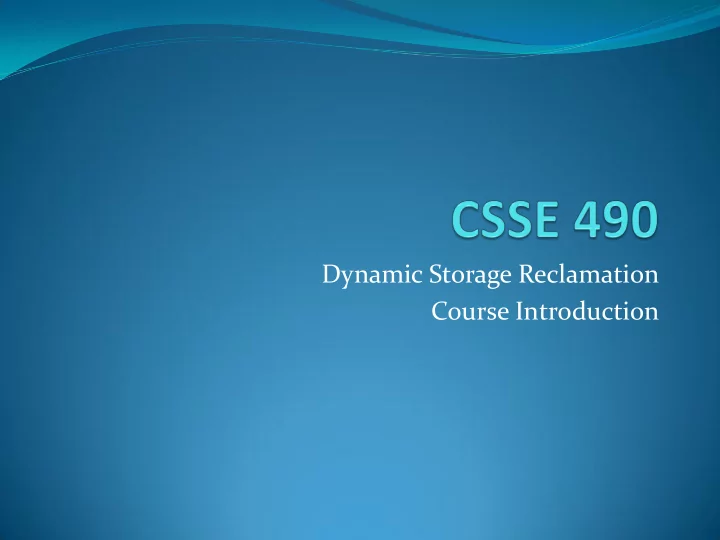

Dynamic Storage Reclamation Course Introduction
Roll call and introductions Name (nickname) Hometown Local residence Major(s) Something exciting you did over the break 2
Administrivia! Background Syllabus Schedule Index page First assignment due next Tuesday 3
Course logistics Goals Explore GC Perform research Discussion and presentations Read and present papers Individual or group project Build a collector Documentation Important part of project 4
Key concepts in managing memory Key challenges and key ideas Explicit vs Automated memory management In which languages is each done? Why? Memory allocation Contiguous allocation Free-list allocation Memory reclamation Tracing Reference counting 5
What is memory management? Programs contain Objects Data Occupy memory Runtime system must allocate and reclaim memory for program in an efficient manner Why is this important? Why is this hard? Why is this interesting? 6
Allocation and Reclamation Allocation Objects dynamically allocated on HEAP malloc(), new() Reclamation Manual/Explicit free() delete() Automated Garbage collection (GC) 7
Explicit memory management pluses Efficiency can be very high Puts the programmer in control 8
Explicit memory management challenges Consumes software development time new allocate storage for new object delete reclaim storage Prone to software faults (reclaim too soon) Foo* p = new Foo(); Foo* q = p; delete p; p->DoSomething(); p = NULL; q->ProcessFoo(); Statically undecidable Problem for developers 9
Explicit memory management challenges Memory leak (never reclaim) #include <stdlib.h> void f(void){ void* s; s = malloc(50); return; } int main(void){ while (1) f(); return 0; } 10
Automated memory management Runtime system automatically Detects dead objects (garbage detection) Reclaims dead objects (garbage reclamation) Garbage collection Preserves software development time Relieves programmer burden Less prone to errors Utilized by most modern OOP and scripting languages Python, Java, C#, php 11
Garbage collection challenges public void f(){ Occurs an unpredictable startLaser(); times Obj o = new Obj(); stopLaser(); Duration is unbounded } Performance efficiency public static void main(…){ issues while (true) f(); } Time GC, Bad for Real- Time 12
Major concerns Explicit memory management Reclaiming objects at the right time Garbage collection Discriminating live objects from garbage Both Fast allocation Fast reclamation Low fragmentation 13
Recommend
More recommend